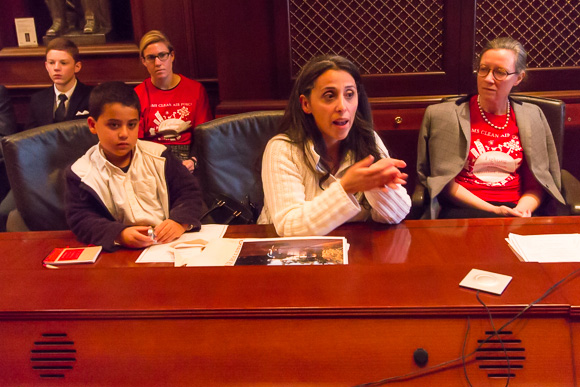First Lady Michelle Obama recently announced that joining her at tonight's State of the Union will be climate scientist Nicole Hernandez Hammer (that's her in the middle of the above photo from Moms Clean Air Force). She also works with Moms Clean Air Force and was profiled with two other Latino climate activists by the Sierra Club's own Javier Sierra just last year. We wanted to reprint this great column from Javier Sierra so everyone can get another glimpse of just how fantastic Hernandez Hammer is and why it's so fantastic that she's a guest of the First Lady's at tonight's State of the Union.
Sierra & Tierra: Three Musketeers Fighting Climate Change
By Javier Sierra
In the battle against climate change, Latinos are in the line of fire. And our musketeers are our scientists.
We Latinos disproportionately suffer the effects of climate change because of our professional activities —we are much more likely to work outdoors— and the parts of the country where we tend to concentrate. But these are just two reasons for our extraordinary awareness of this phenomenon and our urgency to fight it.
Three Latino climatologists and members of the Union of Concerned Scientists offer several other reasons for this climate change awareness and the credibility gap that exists between us and the population at large.
Ana Prados, research assistant professor at the Joint Center for Earth Systems Technology at the University of Maryland, attributes this to Latinos’ international links as the immigrant community that we are.
“We are hearing back from our countries of origin. Latin American governments are not denying climate change and if you look at policy in Latin America, climate change is weaved into it,” says Prados, who teaches climate change science not only to her students but also to policy makers here and abroad.
Robert Mera, a Kendall Fellow on Climate Attribution, agrees with our international outlook but also makes a poignant point.
“Latinos trust science more. I know we are a very religious group. But we also appreciate the world we live in,” says Mera, who contributed to the study that revealed that two thirds of the world’s carbon pollution was generated by just 90 companies.
In fact, a recent survey conducted by the Natural Resources Defense Council showed that scientists are Latinos’ most trusted source of climate change information.
For Nicole Hernández-Hammer, assistant director for research at the Florida Center for Environmental Studies, other reasons include a strong cultural component.
“We Latinos have this special concern and care for the environment, and that’s what’s being identified in the polls. The fact is when I talk with my family about climate change, they know what I am talking about,” says Hernández-Hammer, who is dedicated to educating the public and policy makers about the dangers of sea level rise, especially in South Florida. “Miami, which is almost 70 percent Latino, economically is the world’s most vulnerable city to sea level rise.”
On the other hand, the population at large is walking in the opposite direction. Recent polls reveal that climate change concerns among Americans has hit historic lows. Why?
“Part of it is the interference by certain groups like the Koch Brothers, ExxonMobil, Chevron, that are hiding the important facts and aren’t backed up by real science,” says Mera.
“First, there is a campaign of disinformation,” agrees Hernández-Hammer. “There are organizations that are trying to have a fabricated debate, a pretend debate. And when there is doubt, it causes people to be confused and makes them believe that there is not a conclusion.”
For Prados, there is also a great lack of scientific awareness.
“I teach around the world and I notice that the scientific literacy in the US is lower than just about everywhere, including Latin America. Also some teachers in certain Southern states are prohibited from teaching climate change. That contributes to the lack of literacy of climate change,” she concludes.
Recently, this notion was sadly confirmed by a National Science Foundation survey, which found that one in four Americans believes the sun orbits the earth and that only one third of them support more funding for science and technology.
So, what are the solutions?
“The key is for scientists to bring their issues to the communities and how they can present them in a way that can resonate with their communities, ways that will explain to them their vulnerabilities, especially in coastal areas,” says Hernández Hammer.
“If we educate our citizens, they will be the ones educating public officials. If public officials hear this from their citizens, then they will have to do something,” Prados suggests.
“But the disinformation situation needs to be corrected”, warns Mera. “As long as that’s going to be in the way, there’s going to be a backlash. That’s unfortunate but that’s the case.”
In any instance, they all insist a sense of community must be present in the fight against the climate crisis. In other words, all for one and one for all, in true musketeer spirit.
Javier Sierra is a Sierra Club columnist. Follow him on Twitter @javier_SC
